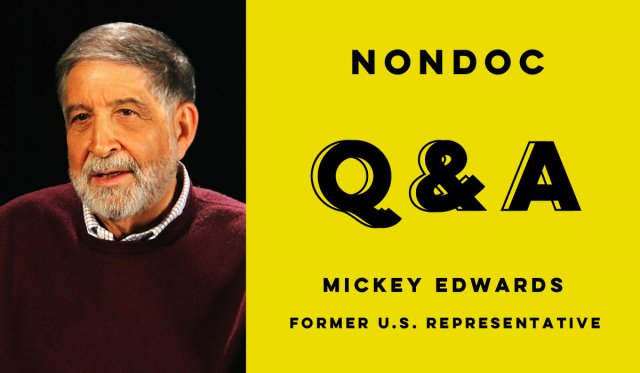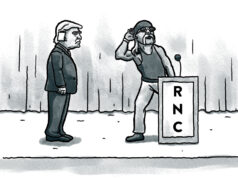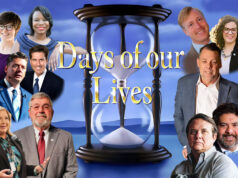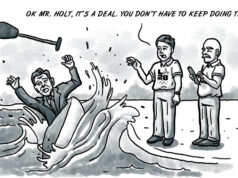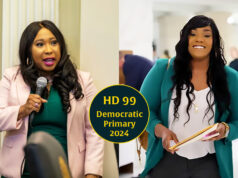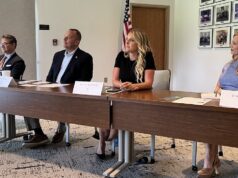When Oklahoma voters sent former U.S. Rep. Mickey Edwards to Congress for the first time in 1977, he was the first person elected to that seat as a Republican in several decades. He spent 16 years in office and became a prominent figure within the GOP. After leaving Congress, he went on to help start the conservative Heritage Foundation.
Most recently, however, Edwards has been in the news for his denunciation of his former party. Shortly after the attack on the U.S. Capitol in January, Edwards told News 4 that he had left the GOP for good, saying the party had turned into “a cult.”
“It’s gone. I mean there is no Republican Party anymore that has values, principles, morals, anything,” he said.
Edwards, who is now 83, currently serves as a professor at Princeton University, with a focus on leadership. Over the years, he has also taught at Harvard and has written a handful of books on government and leadership.
Edwards recently spoke to NonDoc by phone about his views on his former party, Republicans such as Rep. Marjorie Taylor Greene (GA-14), his life as an author and educator, and his hope that someday political parties will be a thing of the past.
The following conversation has been lightly edited for clarity.
You have spent much of your career after Congress teaching. What has been the most rewarding thing about that experience?
I’ve always loved the idea of exploring ideas. Not just in theories, but when they are put into practice. I was lucky enough to teach at Harvard and then on to Princeton. I was able to get together with a lot of very brilliant teachers and outstanding students and kind of explore society and how people interact with each other. I just find it extremely rewarding. I love the classroom and interaction. I love learning. And I enjoy helping to prepare the next generation of leaders. I’ve seen people I’ve taught go on to be elected to Congress and state legislatures.
What are some things you have learned from students over the years?
I teach in a very Socratic way. We have conversations and discussions. They’re really ongoing conversations. I’ve never believed that it is the job of the teacher to get people to echo what they think. These are very bright students at these schools. Sometimes I’ve thought a little too narrowly and there have been occasions where they’ve made me go back and think to myself that maybe I’ve missed something. That’s something I enjoy — hearing from people that are very diverse in their thinking.
After you lost your 1992 GOP primary to Ernest Istook, did you ever give any thought to going back into politics, or was there a conscious decision to close that chapter of your life?
I looked at my career and what I had done. I had achieved a leadership position. I had been very close with Ronald Reagan and his administration. He and I worked on a number of things. Same for the first President (George H.W.) Bush. I felt like I had made my mark.
I didn’t immediately think about teaching. I thought about writing. When people ask me, even today, I always say I am a journalist who went on to other things. I started out as a reporter and editor.
In 2015, you published a book called The Parties Versus the People. The subtitle was, “How to turn Republicans and Democrats into Americans.” Six years later, how do you think that’s working out?
George Washington devoted a large part of his farewell address as president urging against the creation of political parties. James Madison said it. Alexander Hamilton said it. Scholars like David Hume have said the purpose of a party is to gain power, and in order to gain power you have to defeat the other side. That’s all it is. It’s not the purpose of power to find common ground collectively. I belong to a number of organizations, and when there is an issue that needs to be solved all these organizations don’t divide into these various groups and then say, “Let’s hash this out.” We don’t do it that way in any other thing except when it comes to how we select the people who make the laws in our country.
You have been critical of the modern GOP, even publicly leaving the party. How do you assess the current state of the GOP?
I registered as a Republican 60 years ago. I still hold the views that the party held back then. If I were in Congress today, on a lot of different issues, like spending and taxation, I would be voting like a Republican. But that’s not what the party is anymore. I’ve said it is a cult. The GOP of today is characterized by blind obedience and fear of a leader who, in my view, is totally unqualified to be the leader of anything.
Since Georgia Congresswoman Marjorie Taylor Greene was elected, she has stirred controversy for reportedly having past associations with extremist groups and using violent language. When you were on the Hill, was there anyone like that in the House?
We never had anyone like that. That’s an example of the fact more and more people have identified with the negative part of politics to the point where they think such bad things about the other party. People will go to the polls and say, “Well, she wasn’t my choice, but that’s the GOP candidate.” And that’s how they vote because they’ve convinced themselves the other party is evil. I recently got an email from a woman in OKC whose parents were supporters of mine. She said (President Joe) Biden and (Vice President Kamala) Harris were socialists. I wrote back, “Don’t you remember the reason Biden won the primary? Because he is the anti-socialist. He took on Bernie (Sanders) and Elizabeth Warren. He was the guy who stopped the socialist candidates from winning the nomination.” But facts don’t permeate their brains.
How often do you get back to Oklahoma, and what do you miss most about living here?
God, I miss everything about it. I don’t get back very often, because my job is here. I still have family back there. It’s just a beautiful state. I miss being on the OU campus. I miss Oklahoma City. I’m an Okie through and through. I never miss an OU football game. I don’t miss many OU basketball games. I wear my OU sweatshirts. I miss the state. Politically, I don’t know what happened. It’s a different place, and that makes me sad. Ronald Reagan would have no chance to win a GOP primary in Oklahoma for any office. But I love Oklahoma. So many people there were so good to me. They gave me 16 years to serve in Congress.









